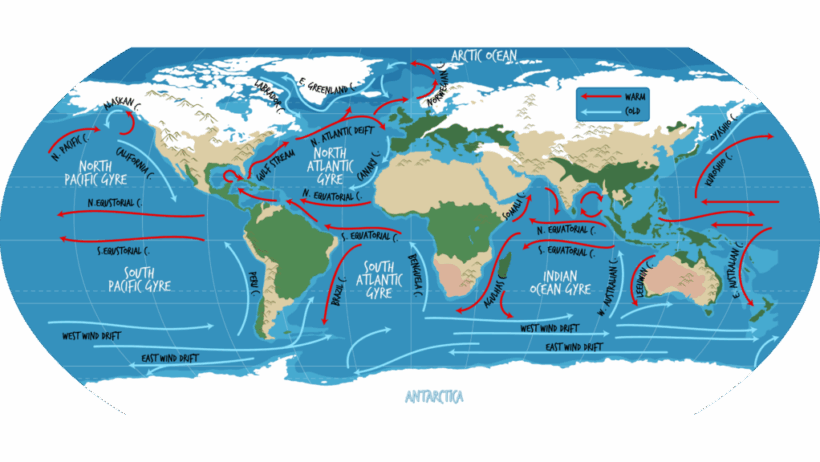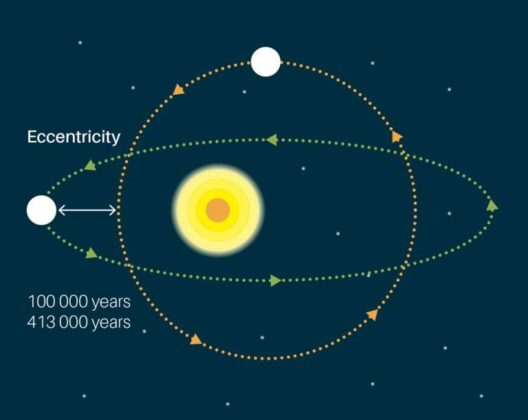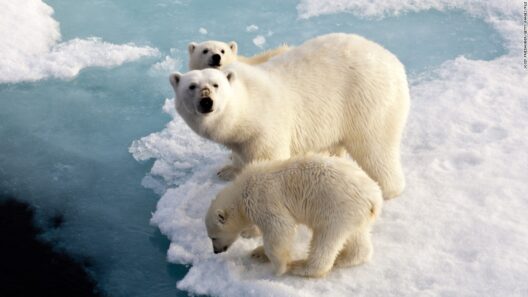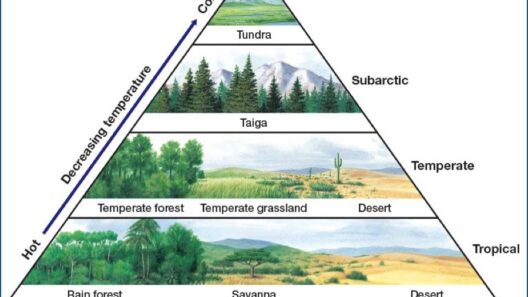In the grand tapestry of Earth’s climate system, ocean currents weave through the fabric of our planet’s ecosystems like nimble fingers stitching together disparate textures. These currents, vast rivers of seawater that flow across our oceans, play an indispensable role in regulating global climate, distributing heat, and nourishing marine life. However, as the world warms, these intricate patterns are beginning to fray, signaling profound changes that could alter our climate in unpredictable ways.
Ocean currents function as the planet’s thermostat, a circulatory system vital for maintaining the equilibrium of temperatures across the globe. The most significant of these currents, the thermohaline circulation, often referred to as the “global conveyor belt,” transports warm water from the equator towards the poles while carrying cold water back to the tropics. This constant movement not only influences weather patterns and precipitation but also has ramifications for ecosystems that rely on the stability of these currents.
As temperatures rise due to anthropogenic greenhouse gas emissions, the delicate balance of ocean currents is being disturbed. Melting polar ice caps and glaciers contribute freshwater into the salty sea, decreasing salinity and, consequently, altering the density-driven mechanisms that propel these currents. It is akin to diluting a rich soup; the flavors are muddled, and the once harmonious blend falters. This dilutive effect can slow the flow of currents, leading to broader implications for climate patterns worldwide. For instance, a slowdown of currents like the Gulf Stream could lead to cooler temperatures in parts of Europe while simultaneously exacerbating warming in other regions. In a world increasingly characterized by extremes, these disruptions may evoke a symphony of climatic discord.
The repercussions of changing ocean currents extend beyond temperature fluctuations. Upwelling zones, regions where nutrient-rich waters rise to the surface to support flourishing marine life, depend on stable current patterns. As currents shift and weaken, these vital zones may experience diminished nutrient delivery. Such a decline could threaten fisheries that millions depend upon for sustenance and livelihoods. The ocean is not merely a body of water; it is a lifeblood that nourishes entire communities. When currents become erratic, the intricate dance of predator and prey in the marine food web finds itself at perilous risk.
The interconnection between ocean currents and atmospheric conditions cannot be underestimated. Changes in sea surface temperatures, driven by fluctuations in ocean currents, can lead to altered weather patterns. For instance, warmer ocean surfaces can intensify hurricanes and storms by providing them with more energy. This phenomenon transforms the ocean from a gentle partner in climate regulation into a treacherous adversary. As the ferocity and frequency of extreme weather events increase, vulnerable coastal communities face mounting challenges, ranging from economic instability to displacement.
In addition to environmental impacts, the societal repercussions of shifting ocean currents are profound. Adaptation to these changes requires urgent action, spanning international cooperation to grassroots initiatives. Coastal cities must brace for rising sea levels and increased storm surges, necessitating the fortification of infrastructure. Communities long dependent on consistent fishing yields may need to pivot their livelihoods, recalibrating their economic strategies in the wake of dwindling fish populations. A broad societal awareness and an understanding of the vital role of ocean currents thus become paramount in our collective response.
The adaptability of our marine ecosystems is a double-edged sword. While some species may thrive in a warmer world—taking advantage of new habitats created by shifting currents—others face extinction. Coral reefs, often called the rainforests of the sea, are already experiencing drastic degradation due to temperature fluctuations and ocean acidification. As ocean currents change, the delicate balance that sustains these vibrant ecosystems hangs in the balance. A world without thriving reefs would lose not only biodiversity but also crucial economic and recreational benefits associated with healthy marine tourism.
Moreover, understanding the complex interplay of ocean currents and climate change requires a multidisciplinary approach. Scientists are employing advanced technologies, from satellite observations to deep-sea buoys, to monitor changes with ever-increasing precision. By harnessing innovations in data collection and analysis, a clearer picture of the future can emerge—one that might offer glimmers of hope in sustaining oceanic health and stability. Nevertheless, the responsiveness of the oceans to climate change remains a formidable puzzle, underscoring the necessity for concerted research and dialogue.
As we stand at the intersection of human activity and natural systems, the fate of ocean currents illustrates the broader narrative of our relationship with the environment. Our actions echo in the depths of the oceans, as all ecosystem changes inevitably circle back to influence humanity. Like a tide that ebbs and flows, our capacity for stewardship must rise. Addressing climate change, protecting marine biodiversity, and advocating for sustainable practices are urgent imperatives. It is our duty to recognize the interconnectedness of all life on Earth and act in a manner that ensures the health of our oceans—for the welfare of future generations and the preservation of the complex web of life that sustains us all.
In conclusion, as ocean currents continue to change in a warming world, the potential repercussions extend far beyond the depths of the sea. These currents are the arteries of our planet, crucial to the vibrant, interlinked patterns of climate and life. Their alteration in response to our warming planet demands a collective response rooted in awareness, innovation, and resilience. The unfolding narrative of ocean currents is a clarion call, urging us towards a deeper understanding of our responsibilities and a commitment to protecting the blue heart of our Earth.






